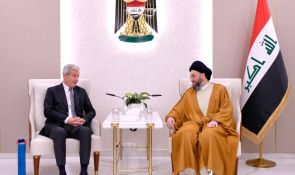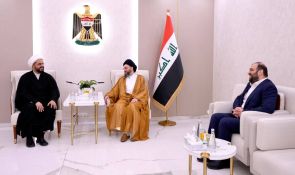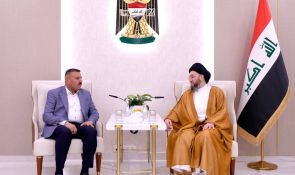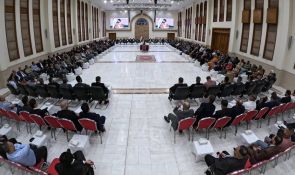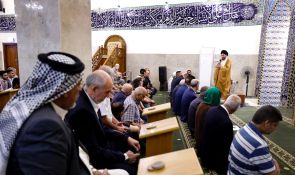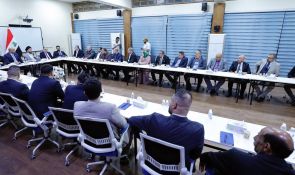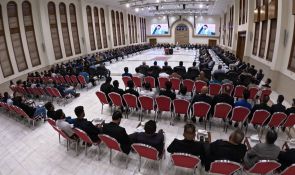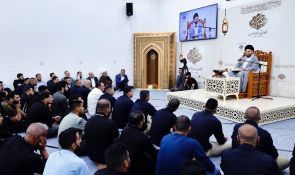Sayyid Ammar al-Hakim, head of the Islamic Supreme Council of Iraq, affirmed that the civil peace and state building initiative took into account the demands of the Iraqi people from the angle of citizenship not of sects, components and religions, explaining that the initiative’s goal is building a civil State that serves and does justice to all Iraqis. He called on the clans’ princes and sheikhs and the tribal leaders to review, read and examine the terms of the civil peace and state building pact put forward by his Eminence not as being issued by the Supreme Council, but rather as a pact that can be modified so as to add what is necessary to be acceptable by all political parties, ethnicities and the components of the Iraqi people, hoping that this pact is taken into consideration, as well as the political project that treats everyone on equal footing under the constitution and the law, while disregarding the partial projects that are considered as continuously bleeding wound that entitles the countries of the region and the UN organizations to offer projects and solutions that don’t match our problems and aspirations because we know well what we want and what we aspire for more than any other one.
This came during a speech delivered by his Eminence in the tribal Diwan of Baghdad held at his office in Baghdad on Saturday, June 6, 2015 which included the heads of the tribes, and leaders and sheikhs of the clans, and prominent figures from the different provinces of the country.
His Eminence said the civil peace and state building pact was written on the basis of what should be offered to the country before thinking of what would be taken and what will other take, because the nation deserves to be given what is most precious for us so that we can take from it. Moreover his Eminence explained that the civil peace and state building pact is not a new initiative. According to him, it falls within the previous initiatives that have been suggested by the political movements, but it was given a different label by reversing the “give and take” equation so as to be in harmony with the state building and preserve the rights of the citizens since they are citizens, not affiliations to ethnicities, sects, components and religions, and its chapters included the ideas and observations of all parties. On the other hand, his Eminence also considered the pact as a draft that can be developed so as to be convincing to all Iraqis and preserve their rights, hoping that a formula can be reached, bringing all the citizens together and that it can constitute a compass that shows where the country is taking us, to where we are going and what we have as commitment towards it.
On the other hand, his Eminence stressed the necessity to fight the politicians who incite on sectarianism, calling on the voters to refrain from voting to them in the future and to punish them for using statements calling for division contrary to what MPs and politicians must call for, i.e. to preserve the national cohesion and unity, and to reject sectarianism and sectarian, ethnic, denominational and religious tension, emphasizing the importance of staying hand in hand, as it is the case in the battles in which all the citizens from all ethnicities and religions participate to expulse the terrorist gangs of ISIS.
His eminence called on the sheikhs and seniors of the Iraqi clans to take the initiative to establish a law that protects the clans and puts things on the right track, urging them to stand against the wrongful behaviors shown by some especially those who pretend being sheikhs and enact wrong laws and impose them on others. He also called contain the problems, because leaving things as they are could increase the problems and difficulties and lead to serious complications, remembering the saying of the Martyr of the Niche Grand Ayatollah Sayyid Mohamad Baqir Al Hakim (may Allah sanctify his soul) that Iraq was preserved thanks to three elements: the religious authority, the clans and Husseini rituals. His eminence assured that the tribal customs aligned with the Islamic vision controls the rhythm of society, noting that without these customs, the society will be out of control and that these customs and values have preserved Iraq and society for a long time. Furthermore, he praised the position taken by the clans and their sheikhs regarding the refusal of these violations of the authentic Arab and Islamic values. His eminence expressed his doubt that these violations and the use of weapons among the clans are spontaneous or accidental, as he thinks that there are evil plans to sow discord and cause fighting between Iraqis in an attempt to support the efforts of ISIS to occupy the Iraqi land.
Sayyid Ammar Al Hakim pointed out that some parties are accusing the clans and their relevant groups with conservativeness and saying that it is imperative to eliminate them in order to establish a modern civil society. He stated that such violations and infringements consolidate the position and rationale of these parties which may echo among some categories of the Iraqi people, insisting that modernity does not mean in any case denying the customs, ethics and values, but mean providing appropriate services, building close human relationships and ensuring well-being for the society. His eminence finally indicated that the tribal system, if managed correctly, is one of the pillars for building a modern and united state.


